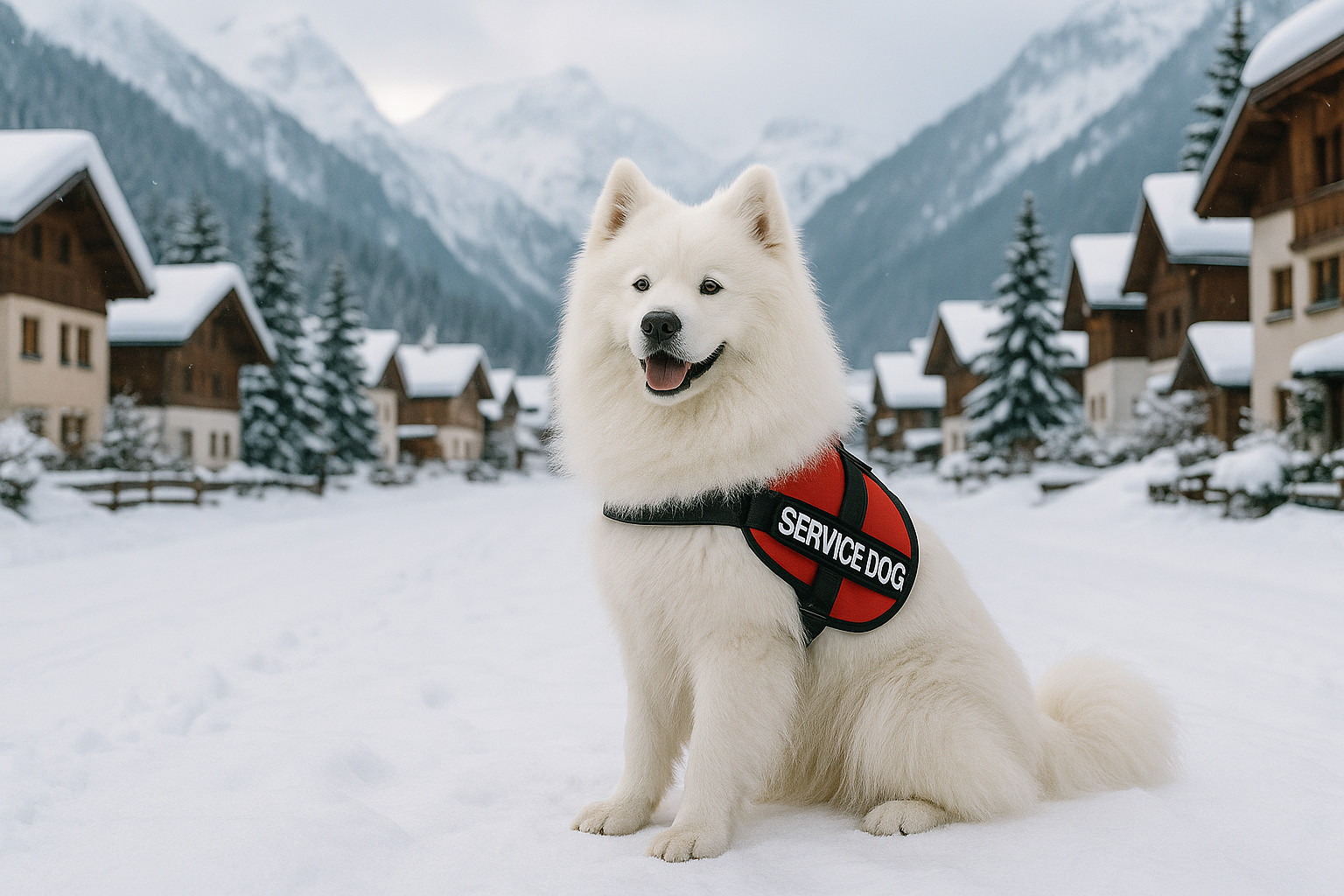Samoyed as a Service Dog

Samoyed Overview
The Samoyed, known for their stunning white coats and friendly temperament, are quintessential representatives of the legacy of working dogs. Originating from Siberia, these dogs were initially bred by the Samoyedic peoples for herding reindeer and pulling sleds across expansive tundras. Their unique history contributes to their robust physical form, adaptable nature, and strong work ethic—attributes that have carved a niche for them in the world of service dogs. Despite not being as commonly associated with service work as breeds like Labrador Retrievers or German Shepherds, the Samoyed possesses certain qualities that make them suitable for specific service roles.
Physical Characteristics
When considering the Samoyed as a potential service dog, their physical characteristics offer both advantages and challenges.
Physical Attributes
- Size and Build: Samoyeds are medium-sized dogs, typically weighing between 45 and 65 pounds. Their robust build contributes favorably to certain types of service work, such as light mobility assistance. However, their size might be limiting in environments where space is constrained.
- Fur and Grooming: The Samoyed's thick, double-layer coat is both a blessing and a burden. While it provides protection from harsh weather, it requires regular grooming to prevent matting. This high-maintenance factor could be a consideration for potential handlers.
- Energy Level: Known for high energy levels, Samoyeds require regular exercise to maintain their physical and mental health. This trait can be beneficial in active service roles but may be overwhelming for handlers not prepared for an active lifestyle.
Temperament and Attitude
The Samoyed is primarily known for its cheerful disposition and sociability, making it a promising candidate for many service roles.
- Affectionate and Friendly: The breed's natural inclination towards friendliness makes them approachable and easy to handle in public settings. This is especially advantageous in therapy or emotional support roles where interaction with a variety of individuals is required.
- Intelligent and Curiosity: The Samoyed is an intelligent breed, capable of quickly learning new tasks. However, their curious nature can also lead to distractions, requiring a handler adept at keeping them focused.
- Independent yet Reliable: While Samoyeds enjoy human company, they exhibit a level of independence. This can be both a strength—indicating self-sufficiency—and a challenge, as they may not always seek direction from their handler in chaotic situations.
Types of Service Work
The inherent qualities of Samoyeds make them suitable for various, albeit specific, service roles.
- Therapeutic and Emotional Support: Due to their friendly and approachable nature, Samoyeds excel in providing emotional support and comfort. Their constant wagging tail and engaging presence can brighten the mood of individuals in therapeutic settings.
- Light Mobility Assistance: While they may not have the size or strength for heavy mobility tasks, Samoyeds can assist individuals with certain mobility challenges, such as fetching objects or serving as a support during transitions from sitting to standing positions.
- Medical Alert: With training, the keen senses of a Samoyed can be honed for specific medical alert tasks, such as detecting allergens or providing diabetic alert signals.
- Search and Rescue: Their origins in harsh climates and history of working as sled dogs grace them with strong resolve in difficult conditions, making them viable candidates for search and rescue operations.
Health Considerations
While Samoyeds are generally robust dogs, they are predisposed to certain health conditions which need consideration in the context of service work.
- Hip Dysplasia: This common issue among larger breeds can impact a Samoyed's suitability for tasks requiring extensive physical exertion, such as mobility assistance.
- Progressive Retinal Atrophy (PRA): This degenerative eye disorder can lead to vision loss, affecting the dog's ability to perform tasks effectively over time.
- Hypothyroidism: A manageable yet chronic condition that requires lifelong care, potentially impacting the dog's overall activity levels and adaptability to service roles over the long term.
Addressing these health conditions proactively, with suitable medical interventions and maintaining regular check-ups, is crucial to ensuring the prolonged efficacy of Samoyeds in their service roles.
Training and Suitability
Training a Samoyed to be a service dog involves particular strategies tailored to their unique characteristics.
- Trainability: Known for their intelligence, Samoyeds can be trained to perform various tasks. However, their independent nature mandates a training program that is consistent and rewarding, using positive reinforcement to encourage adherence to tasks.
- Consistency and Dedication: Training should start early in a Samoyed's life, focusing on obedience and task-specific skills. Consistency is crucial to managing their curious and sometimes stubborn disposition.
- Socialization: Given their social nature, extensive socialization is beneficial for a Samoyed. Exposing them to diverse environments ensures they remain calm and composed in public spaces, a critical aspect of all service roles.
- Focus and Attention: Due to their inquisitive nature, training should also emphasize enhancing the dog's focus and minimizing distractions. This can be achieved through structured routines and targeted training exercises.
Summary of Samoyed
In conclusion, the Samoyed possesses distinctive qualities that make them a viable option for specific service dog roles. Below is a summary of their key strengths, weaknesses, and ideal service roles:
- Strengths:
- Friendly and sociable, ideal for therapeutic and emotional support roles.
- Intelligent and capable of learning complex tasks.
- Adaptable to various environments, from domestic to professional settings.
- Weaknesses:
- Requires significant grooming and maintenance due to their thick coat.
- Potential health issues like hip dysplasia and PRA that could impact service work capability.
- High energy that necessitates regular exercise and can be challenging in less active environments.
- Ideal Service Roles:
- Therapy and Emotional Support: Their disposition and charm make them excellent companions for those in need of emotional solace.
- Light Mobility Assistance: Suitable for individuals requiring minimal physical support.
- Search and Rescue: Their determination and endurance make them suitable for retrieval tasks in harsh conditions.
The Samoyed, with its endearing personality and eager-to-please attitude, can bring substantial value to service settings when matched with roles complementing its attributes.











